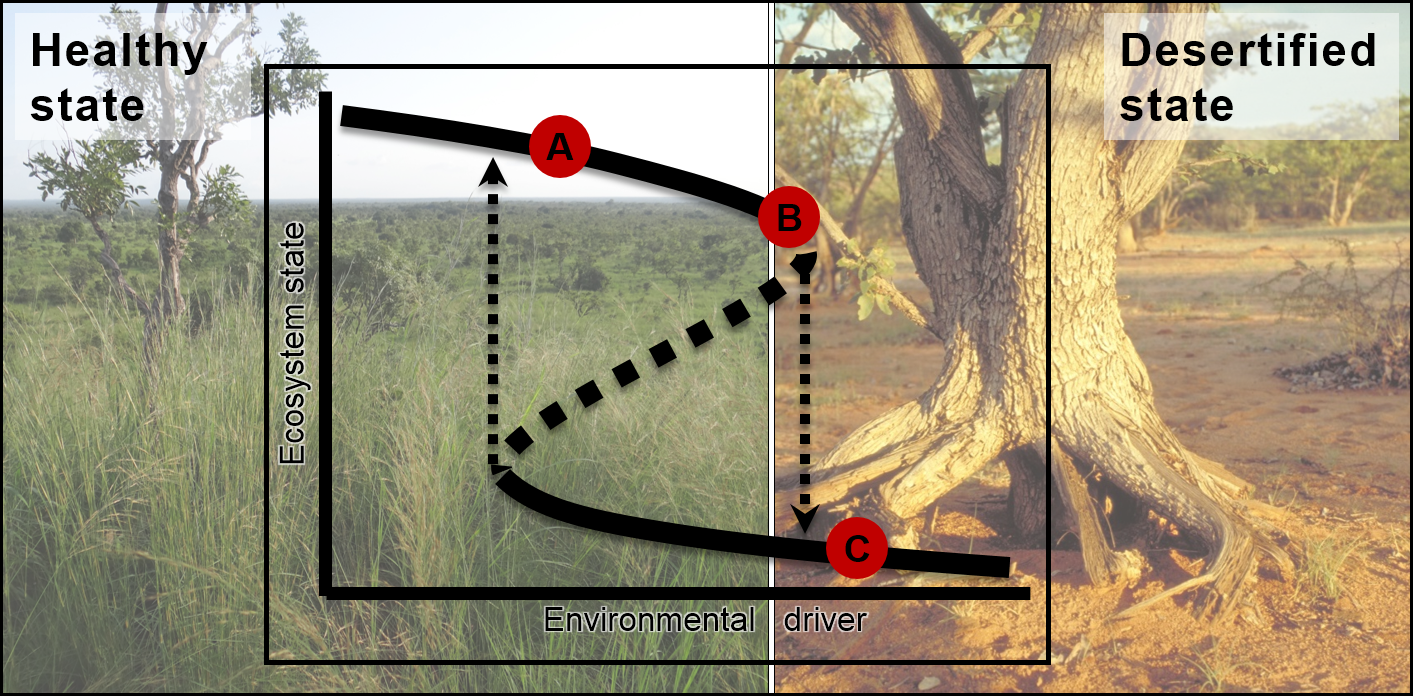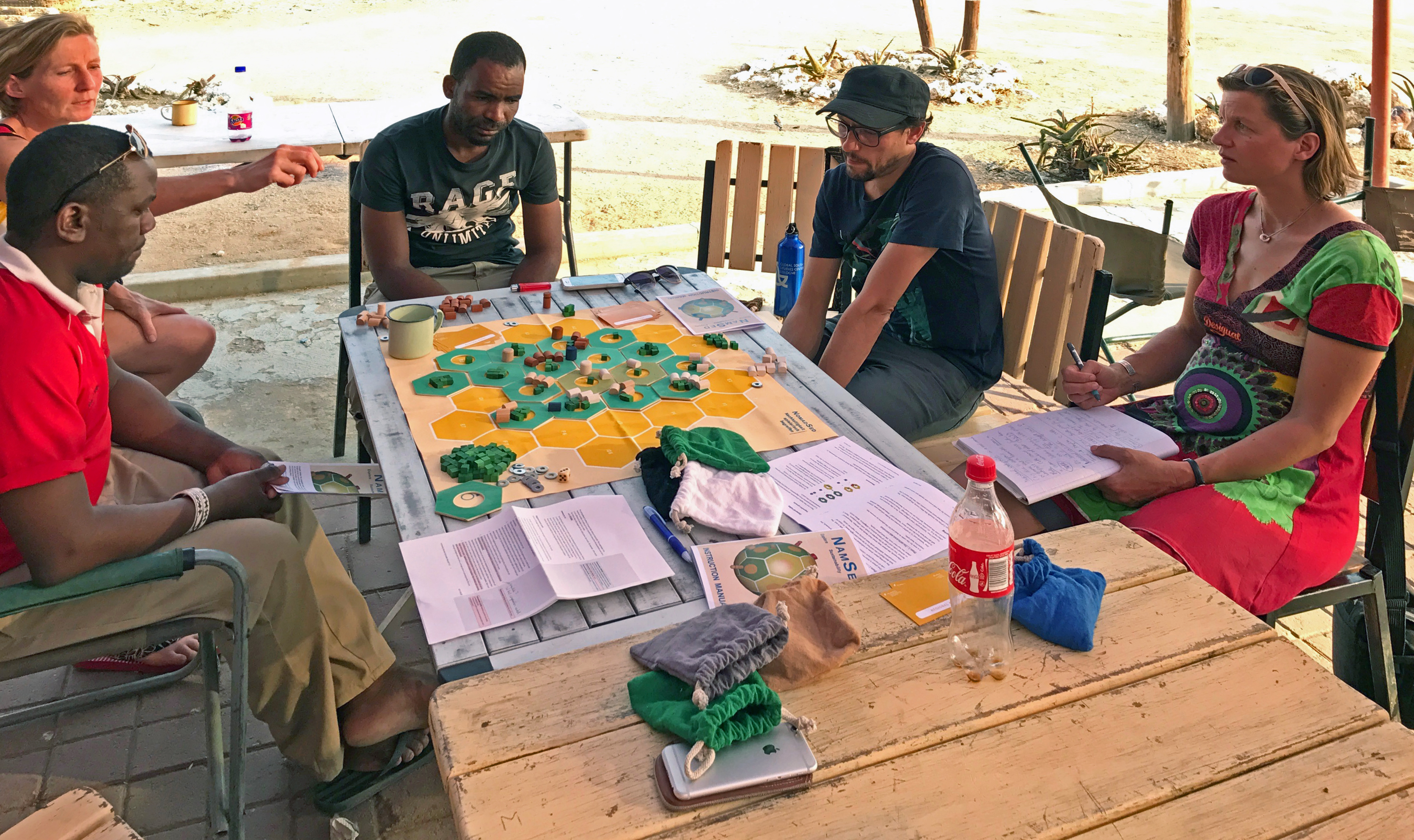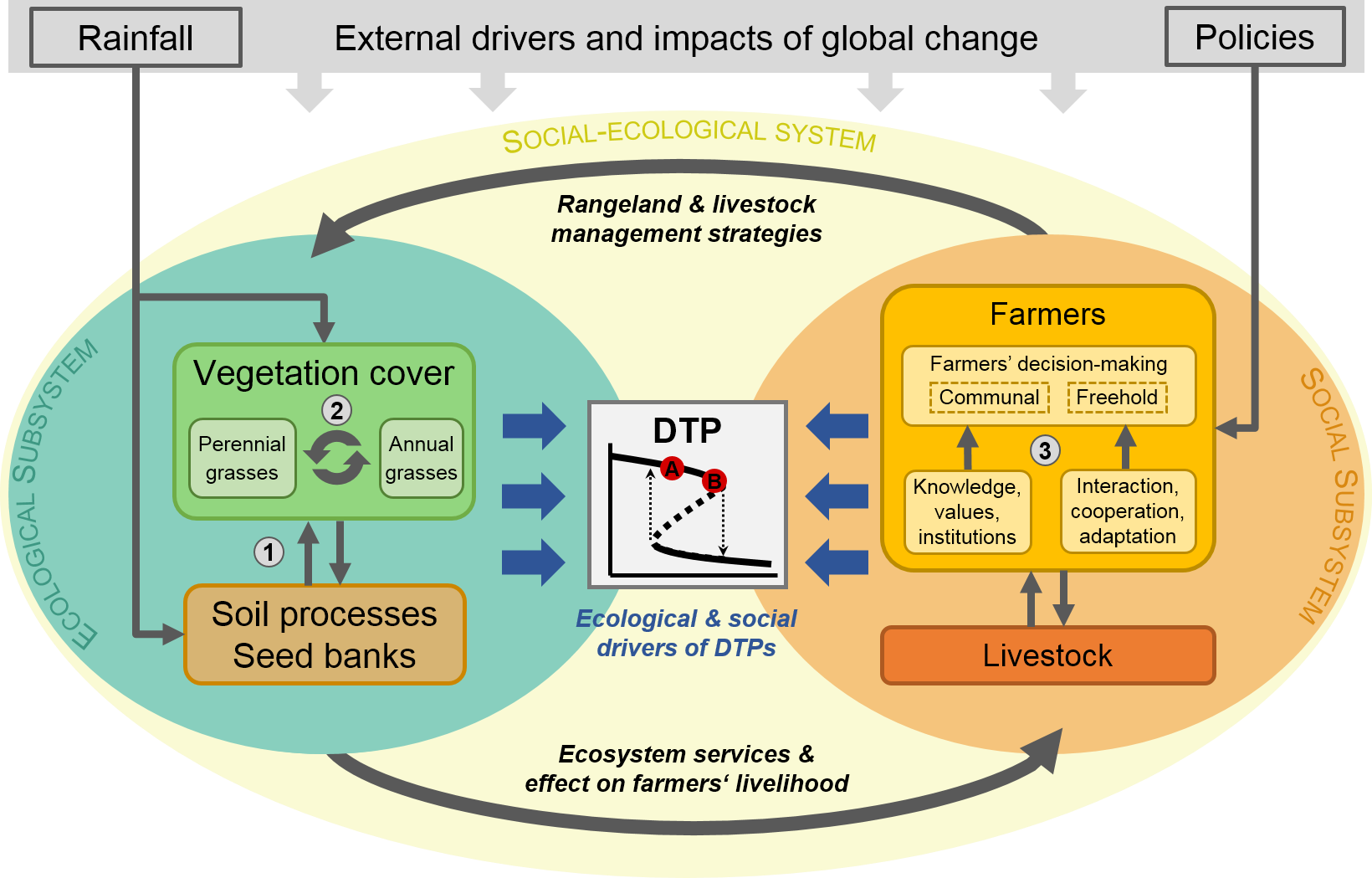
 Understanding and Managing Desertification Tipping Points in Dryland Social-Ecological Systems – A Namibian Perspective
Understanding and Managing Desertification Tipping Points in Dryland Social-Ecological Systems – A Namibian Perspective
Drylands are well-known for regime shifts, where small shifts in human pressures and/or environmental conditions bring about abrupt changes towards alternative states. One major type of regime shifts in drylands is known as desertification. It typically involves a switch to predominantly bare soil conditions when losing perennial grasses.
Namibia is the driest country in sub-Saharan Africa, representative for many semi-arid regions in the world that face problems of scarce natural resources, infertile land, extreme climate events such as droughts, population growth and urbanization processes. The total of these factors makes Namibia an ideal study area for understanding desertification tipping points (DTPs), and for identifying appropriate management and policy measures to prevent them.
The NamTip project strives for a better understanding of desertification tipping points. We will focus on the Greater Waterberg Landscape approx. 250 km north of Windhoek as joint study area, which combines a range of different land-use types (communal and freehold farmlands, communal conservancies and a national park) in close vicinity of each other. The NamTip project has two main objectives:
Objective I: Understand ecological and social drivers for DTPs.
Objective II: Explore and communicate management options in the face of DTPs.
Subproject 4: Scenario development and modelling of management options
At UFZ, we are leading a subproject focussed on a) the development of future land use scenarios, b) the analysis of decision-making strategies of farmers in the face of tipping points and c) the model-based exploration of tipping point dynamics and management options.
 Game session of NamSed prototype during pre-phase (Sept. 2017).
We will explore the decision-making processes of communal and freehold farmers in the face of desertification tipping points, and how they perceive potential futures of local SESs.
Game session of NamSed prototype during pre-phase (Sept. 2017).
We will explore the decision-making processes of communal and freehold farmers in the face of desertification tipping points, and how they perceive potential futures of local SESs.
The task combines well-established methods from social and environmental sciences (vignettes, scenario development) with the novel approach of Serious Gaming. For this, we will adapt NomadSed, a strategic board game developed by UFZ for environmental education, to the specific setting of the local SESs in the Greater Waterberg Landscape and transform it into the Serious Game ‘NamSed’.
Our goals are:
- Develop qualitative scenarios of how farmers envision future land use options under different social and environmental conditions.
- Identify feasible decision-making strategie of farmers to proactively manage their rangelands in the face of DTPs.
 Conceptual diagram, showing relationships between main components of the social & ecological subsystems.
We will use an agent-based modelling approach to explore the dynamics of local rangeland SESs, to understand the drivers and mechanisms that lead to a DTP, and to identify early-warning-indicators and suitable management interventions in the face of looming DTPs.
Conceptual diagram, showing relationships between main components of the social & ecological subsystems.
We will use an agent-based modelling approach to explore the dynamics of local rangeland SESs, to understand the drivers and mechanisms that lead to a DTP, and to identify early-warning-indicators and suitable management interventions in the face of looming DTPs.
To this end, we will integrate qualitative and quantitative empirical results developed across the project. The model will capture feedback processes between ecosystem dynamics and farmers’ management strategies, an will allow us to explore system dynamics in time and space under different processes of global change.
Our goals are:
- Obtain a mechanistic understanding of the emergence of a DTP (including early-warning indicators).
- Assess livelihoods of farmers under changing system conditions.
- Identify suitable intervention strategies.
We will foster the exchange and evaluation of new knowledge on DTPs for its contribution to societal and scientific progress with a focus on both academic as well as non-academinc capacity development, including:
- Supervision of Namibian PhD & MSc students.
- Teaching a short course on agent-based modelling of social-ecological systems.
- Development of an educational version of the NamSed game for young learners and teachers, as a contribution to the mobile classroom programme Ombombo' developed by our Namibian project partner EduVentures.
Project team at UFZ
Project partners & Funding
The project is led by PD Dr. Anja Linstädter, University of Bonn.
| German project partners | Namibian project partners |
|---|---|
| University of Bonn | University of Namibia (UNAM) |
| Eberhard Karls University of Tübingen |
Namibian University of Science and Technology (NUST) |
|
University of Cologne |
EduVentures |
| Helmholtz Centre for Environmental Research - UFZ |
AGRA Limited |
| Institute for Social-Ecological Research (ISOE) |
The project is funded by the German Federal Ministry of Education and Research (BMBF) under the programme "BioTip".

